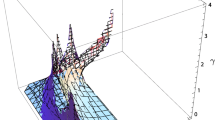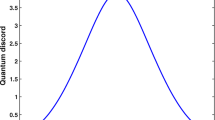Abstract
We have applied the “minimal” quantization scheme to investigate the quantization of the classical Stackelberg oligopoly. In particular, we have examined how the quantum entanglement affects the first-mover advantage in the Stackelberg game. It is found that the first-mover advantage can be destroyed and turn into a disadvantage under appropriate conditions. That is, the second-mover advantage can be realized in the quantum Stackelberg oligopoly. This surprising feature raises a challenging question to each of the players in the quantum game: “Should I move first or not?”

Similar content being viewed by others
Data Availability Statement
All data generated or analysed during this study are included in this published article.
References
Meyer, D.A.: Quantum strategies. Phys. Rev. Lett. 82(5), 1052 (1999)
Eisert, J., Wilkens, M., Lewenstein, M.: Quantum games and quantum strategies. Phys. Rev. Lett. 83(15), 3077 (1999)
Benjamin, S.C., Hayden, P.M.: Multiplayer quantum games. Phys. Rev. A 64, 030301 (2001)
Chen, J.L., Kwek, L.C., Oh, C.H.: Noisy quantum game. Phys. Rev. A 65, 052320 (2002)
Chen, K.Y., Hogg, T., Beausoleil, R.: A quantum treatment of public goods economics. Quantum Inf. Proc. 1(6), 449 (2002)
Chen, L.K., Ang, H., Kiang, D., Kwek, L.C., Lo, C.F.: Quantum prisoner dilemma under decoherence. Phys. Lett. A 316, 317 (2003)
Li, H., Du, J., Massar, S.: Continuous-variable Quantum Games. Phys. Lett. A 306, 73 (2002)
Obsborne, M.J., Rubinstein, A.: A course in Game theory. The MIT Press, U.S.A. (1994)
Lo, C.F., Kiang, D.: Quantum Oligopoly. Europhys. Lett. 64(5), 592 (2003)
Lo, C.F., Kiang, D.: Quantum Stackelberg Duopoly. Phys. Lett. A 318, 333 (2003)
Lo, C.F., Kiang, D.: Quantum Stackelberg Duopoly with Incomplete Information. Phys. Lett. A 346, 65 (2003)
Lo, C.F., Kiang, D.: Quantum Bertrand Duopoly with Differentiated Products. Phys. Lett. A 321, 94 (2004)
Lo, C.F., Kiang, D.: To Move First or Not to Move First? Quantum Inf. Process. 18, 335 (2019)
See, for example, Khan, F.S., Solmeyer, N., Balu, R., & Humble, T.S.: Quantum Games: a Review of the History, Current State, and Interpretation , Quantum Inf. Process. 17 , 309 (2018); R. Alonso-Sanz, Quantum Game Simulation (Springer, Switzerland, 2019)
Lo, C.F., Yeung, C.F.: Quantum Stackelberg-Bertrand duopoly. Quantum Inf. Process. 19, 373 (2020)
Gibbons, R.: Game Theory for Applied Economists. Princeton University Press, U.S.A. (1992)
Author information
Authors and Affiliations
Additional information
Publisher's Note
Springer Nature remains neutral with regard to jurisdictional claims in published maps and institutional affiliations.
Rights and permissions
About this article
Cite this article
Lo, C.F., Yeung, C.F. Quantum Stackelberg oligopoly. Quantum Inf Process 21, 85 (2022). https://doi.org/10.1007/s11128-022-03423-x
Received:
Accepted:
Published:
DOI: https://doi.org/10.1007/s11128-022-03423-x




